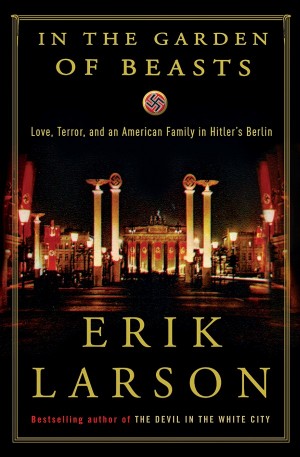Alone in the Garden
In W.B. Yeats’ poem, The Second Coming, he describes a pre-WWI climate in which, “the best lack all conviction, while the worst/ are filled with passionate intensity.” During times of great turbulence in history, it is a rare man who clearly sees and understands what is going on around him, and does the right thing. American Ambassador William Dodd, one of the protagonists in, In the Garden of Beasts, Erik Larson’s new history of Hitler’s Berlin in the years before the Second World War, is such a man.
The book opens in 1933 as Dodd considers, and ultimately accepts, a position that few qualified men wanted—ambassador to Germany—and convinces his two grown children to accompany him and his wife to become President Franklin Roosevelt’s “American liberal” in Berlin.
As Dodd begins the delicate tightrope walk of diplomatic work in Berlin, questions as simple as what to drive, where to live and who to hire are fraught with tension.
On the one hand, Dodd must pressure the Nazi powers as Storm Troopers, soldiers, and police harass American citizens who do not offer the Heil Hitler. At the same time, he must strive for peace and assuage the fears of American Jewish leaders, so that their outspoken criticisms of Hitler and his regime do not complicate tenuous German-American relations.
Worse, Dodd is constantly undermined by his peers at the State Department, who believe him the wrong man for the job. A quiet, frugal academic by nature and training, he did not particularly enjoy lavish state dinners and parties.
At this time, the State Department was far more concerned with Germany repaying its war debts to the United States than with its growing militarism and anti-Semitism. Angering Nazis high in government could have jeopardized American financial interests.
The book is much enhanced by the perspective of Dodd’s 24-year-old daughter Martha, the other protagonist.
Martha kept a diary and published a memoir of her time in the city. Her story in Berlin is one of transformation. Upon arrival in Germany, she is enthralled by the culture and the people. She is fervent in her belief that the Nazi revolution was the best way for Germany to recover from the economic devastation of WWI. Gradually though, through acts of repression and brutality large and small, she begins to see cracks in the grand façade of Nazism. The end of the book holds an unpleasant historical account whose callousness will surprise most readers.
Also detailed are Martha’s sexual escapades during her time in Germany, which even included being set up with the Führer himself.
In his introduction, Larson explains that his curiosity about the pre-war era in Berlin came from the often-asked question of why no one realized Hitler’s true intent, and stopped him before it was far too late.
“My objective was…” Larson writes, “to reveal that past world through the experience and perceptions of my two primary subjects.” In this, Larson succeeds brilliantly. The reader has a real sense of the bustle and beauty of the city, as well as, the burgeoning tension that increased throughout the thirties. One of the Dodds’ favorite places in the city was the Tiergarten, the namesake “garden of beasts,” a lush park in the middle of the city where the ambassador loved to take long walks. The park comes alive so artfully that it is almost another character in the book; looking on, knowing yet impassive, at the madness of the men around it.
While few will doubt Dodd’s heart or intentions, one may question, as some of his state department colleagues did, if a louder voice, a stronger hand, or a showier exterior would have fared better against the Nazis.
Though it is doubtful that any one man could have done much to stop the tide of war, Dodd is vindicated by history in some ways. He understood Hitler’s agenda and potency better than even some Nazis at the time. e certainly understood it better than most in what would later become the Allied powers. While he did nothing so directly heroic as Oskar Schindler, for example, in his own quiet, professorial way, he took a courageous stand against the Nazis as directly as he could. In a world rife with tension and military conflicts, Dodd and Martha’s compelling and ultimately heartbreaking story bears revisiting.



